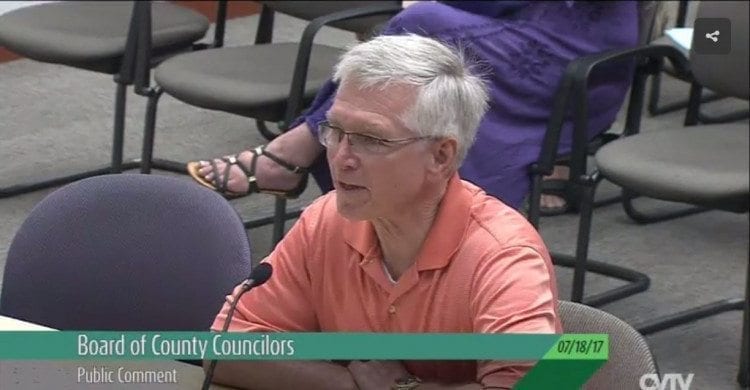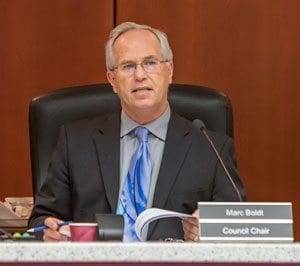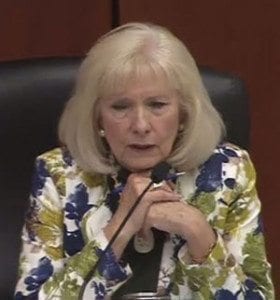
Clark County Council Chair Marc Boldt offered some interesting information during Tuesday’s board meeting regarding Oregon’s efforts to toll drivers on I-5 and I-205.
The issue was not on the agenda before the councilors but thanks to the testimony of citizens Steven Wallace and John Ley, the issue of Oregon’s plans to toll drivers on the two interstates was still a part of Tuesday’s meeting.


After Wallace’s testimony during public comments, Boldt responded with information he said he had just gathered last week.
“Just for your information, for Oregon to get to the feds to request that (approval of plans to toll drivers), I found out last week it has to go through the Regional Transportation Commission to say ‘yes’ or ‘no.’ Three of us sit on that. That’s where we will have our say.’’

Remember, Oregon lawmakers recently approved their transportation package, which includes their intention to toll drivers on I-5 and I-205 in stretches on the interstates south of the Columbia River. This would obviously have a tremendous impact on Clark County citizens, including the more than 70,000 Washington residents who commute to Oregon to work.
Oregon must formally submit their proposed plan for federal approval by the end of 2018. Elected officials in Clark County I have spoken to have recently been seeking clarification as to what the federal approval process would entail. Those details are still unknown to many.
Boldt’s Tuesday declaration indicates Clark County elected officials will have a voice in the path that Oregon lawmakers must traverse in order to accomplish their goal of tolling drivers. Boldt and fellow councilors Eileen Quiring and Jeanne Stewart are the Clark County Council representatives currently on the Board of Directors of the Southwest Washington Regional Transportation Commission (RTC). Stewart is the chair of the RTC board.
RTC is governed by the members of the Board of Directors, which oversees the business affairs of the organization. The Board’s purpose is to manage the property and business affairs of RTC, to adopt a Regional Transportation Plan, to select and program transportation grant funds as directed by federal and state law, and perform other duties pursuant to applicable federal and state laws.
The Board includes 14 members representing general purpose governments, special purpose districts, governmental agency, or political subdivision, which is a party to the governing Interlocal Agreement. For more information, or to view a list of the other members, go to http://www.rtc.wa.gov/agency/board/#roster .
In my opinion, there is ample evidence for citizens of Clark County to be suspicious of the members of the RTC Board and their willingness to represent the views of area residents. Many members of the board have spoken in favor of light rail, which a majority of Clark County citizens are not, and many of the board members have shown themselves to approve of the resurrection of the Columbia River Crossing project. And, some of the board members are not elected officials, which brings in to question what weight a vote of the RTC Board members will carry.

Quiring commented at Tuesday’s Clark County Council meeting that the RTC “slipped’’ recently when Board members were left in the dark far too long about Oregon lawmakers’ plans for tolling.
“If RTC is supposed to vet some of these things prior to them even being in a bill then they slipped because there didn’t seem to be any knowledge whatsoever of that when it came up at the RTC (meeting),’’ Quiring said. “The gentleman from ODOT (Region One Manager Rian Windsheimer) was talking about this bill that had already had a hearing and was going to have a hearing the next day and in that bill was this tolling provision.
“I think it’s just incumbent on us as Clark County councilors, more incumbent on us as the governing body here in the county, to say something mainly because it affects our constituents more than anybody else,’’ Quiring said. “They travel over to work there. Indeed they are paying income tax already, which should pay for some of this infrastructure they are trying to improve.’’
It would be absolutely unfathomable to me for any of the Clark County members of the RTC Board to vote in favor of Oregon’s plans to toll drivers on I-5 and I-205. There is nothing in it for Clark County residents. The revenue generated would go to Oregon lawmakers’ efforts to address their state’s current transportation issues and those efforts don’t include another crossing over the Columbia River or additional lanes on I-205 or I-5. Even the improvements for the Rose Quarter area on I-5 in Portland currently in Oregon’s transportation plan don’t include any additional lanes.
Clark County residents owe citizens like Wallace and Ley (video testimony links available with this column) a debt of gratitude for keeping the conversation alive of Oregon’s plans to toll because there has been a remarkable lack of leadership from our elected officials on this issue.
Clark County residents also need to get in the ears of RTC Board members — including councilors Boldt, Stewart and Quiring — and make sure that when it comes time for them to address this issue they will act in the interests of Washington residents and vote against Oregon’s plans for tolls.




